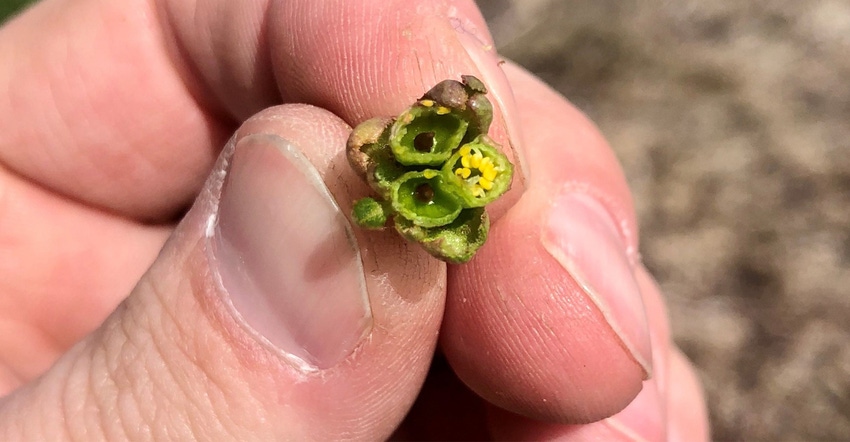May 19, 2020

For the most part, the frost fans didn’t work, which made Michael DeRuiter and his crew’s weekend all-nighter a fruitless one.
Still, the Oceana County apple and cherry grower ventured out May 9 to his orchards. What he found after the freeze event were black-and-brown pistils.
Other farms across western Michigan met a similar fate, says DeRuiter, who serves as District 7 director for the Michigan Farm Bureau, representing farmers from Montcalm, Muskegon, Newaygo, Oceana and Osceola counties.
“We are cutting buds in order to get a view of the pistil, the female part,” DeRuiter says. “Some of the lake guys are guessing a 40% to 50% crop, which I believe because they were a little warmer. When you move to the Hart area, we are staring at a third of a crop for cherries. Apples are variable. You get out to Elbridge Township, and it's a goose egg [for cherries]. I am cutting buds out there, and I can't find a viable cherry bud at all. It's a smoke job out in Elbridge.”
Temperatures dipped into the low 20s on May 9, says DeRuiter, noting the low in Oceana County reached 25 degrees F.
“Typically, you get a few degrees, and you hope your fans warm up the area,” DeRuiter says. “There was maybe a degree or two of inversion. ... From the farmers I talked to, the consensus was the fans didn't do a whole lot of good with that particular situation.”
In southwest Michigan, MSU Extension small fruit educator Mark Longstroth expects moderate to severe damage for all fruit crops after the freeze.
“This area was hurt badly, but we were the coldest area in the state, and other areas were not as far along and will have suffered less damage,” Longstroth wrote in an email. “I will be out looking at apples, blueberries and grapes this morning, and I expect to see damage in all of them.”
Longstroth told Farm Service Agency directors in Allegan, Berrien and Van Buren counties the freeze dropped area temperatures to the lower 20s and “severely damaged most fruit crops in the region.”
“The coldest temperatures were in the region east of Benton Harbor and west of Kalamazoo [20 to 26 degrees F],” he wrote. “There were warmer temperatures both to the north and south. … Areas close to Lake Michigan were warmer than interior sites. There was a weak inversion. There seemed to be a two-degree difference between high and low sites in the region. Some growers used wind machines and irrigation to prevent damage to their crops.”
Longstroth has already inspected live and dead apples, grapes and plums in southwest Michigan. Growers, he added, will continue to assess damages.
As crop insurance specialists for Farm Bureau Insurance, Ryan Fox (western Michigan) and Brenda Szach (northwest Michigan) said “significant” damage occurred in their coverage areas.
“We froze for at least two to three hours on the west side on [May 8], and I'm sure [May 9] too,” Szach says. “Most of our clients are trying to assess damages in orchards today and tomorrow. Clients in Van Buren [County] were hit with at least seven hours of freezing temperatures.”
Fox says damages occurred for crops farther away from Lake Michigan.
“The cherries got hurt, especially the farther away from the lake you are,” he says. “It got really, really cold. Growers are cutting into clusters and seeing some black ones and some not. We don’t know how much of a crop is there.”
Elsewhere, Dawn Drake, general manager of Michigan Agricultural Cooperative Marketing Association's Apple Division, says apple damage varied regionwide.
“It sounds very bad in southwest Michigan,” she says. “It’s too early to tell the extent as we need warmer temperatures to actually see it."
The May freeze is just another form of bad news for Michigan tart cherry growers, DeRuiter says, given the failed dumping lawsuit against Turkey and already poor commodity prices.
“Even at 100% crop, tart cherry growers are struggling to pay bills,” DeRuiter says. “Say you get 30% of a crop, what percentage is going to get abandoned? If you can't afford to grow 100% of a crop, how in God's green earth are you going to afford to operate on a third of the income? I've talked to some growers, and they are trying to see if it's worth it for them to keep spraying the current crop or keep leaves on the trees and call it a day.”
Source: MFB, which is solely responsible for the information provided and is wholly owned by the source. Informa Business Media and all its subsidiaries are not responsible for any of the content contained in this information asset.
You May Also Like




